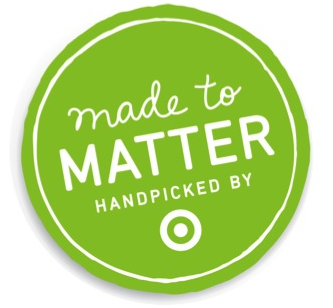Sales of “Made to matter-Handpicked by Target” expected to exceed 1 billion in 2015.
Made to Matter-Handpicked by Target was launched in 2014 with 16 organic, sustainable and natural brands. Products originally spanned five categories—Baby, Beauty and Personal Care, Grocery, Healthcare and Household. In less than a year, the collection has grown to over 31 brands with additional categories including Pets, Sporting Goods and Lawns and Patios.
What attributes qualify for Made to matter?
For brands to qualify for Made to matter, they must support the 3 pillars of the program:
- Foster unique collaborative partnerships
- Develop exclusive innovations
- Be committed to Social Responsibility
Consumers can search by feature, for example gluten free, organic, or non-GMO. They can search by category, such as Baby or Healthcare and by brand, which includes Method, Annie’s and Seventh Generation to name a few.
Why did Target launch Made to matter?
Target listened to their customers and addressed a growing trend. People want safer products that are better for them and better for the world. Consumers are seeking authenticity and transparency from the brands they purchase.
Based on sales results, it is clear their strategy is working. Target also offers exclusive products and is attracting new eco-conscious consumers to its stores.
Are chemical restrictions included in Made to matter?
Consumers can search for products that specifically restrict certain chemicals and chemical classes. These include:
1. Fragrance free. Some fragrances cause allergic reactions, or worse yet contain chemicals that may be carcinogens or neurotoxins.
2. Paraben free. Parabens act as preservatives in cosmetics and personal care products. Some are endocrine disruptors and may be linked to breast cancer.
3. Aluminum chlorohydrate free. Aluminum salts are present in some antiperspirants and a few studies have shown a link to Alzheimer’s disease and breast cancer.
4. Phthalate free. Phthalates soften plastics and are used in many consumer products. Their presence has been linked to a variety of health issues including breast cancer, birth defects and asthma
5. Sodium lauryl sulfate free. These chemicals provide a cleaning action in many personal care products. Their presence has been linked to cancer although there is no hard data to support this claim.
I am impressed with Made to matter. I typically give my business to the brands in the program. However, I would like to see more information about the criteria for entering the program and the important verification requirements. In addition, I wonder about some of the restricted chemical choices.
I want to know when APPAREL will make its entrance in Made to matter.
Impact to your business
Questions to Consider:
- Do you work for a company that meets the Made to matter criteria?
- What actions are you taking to address this ongoing consumer trend?
For help with any issue associated with chemicals, contact Amanda Cattermole at (415) 412 8406 or Amanda@cattermoleconsulting.com. We can help you develop powerful solutions to protect your company and brand reputation that result in safer products manufactured in cleaner supply chains.
Tips and Insights contains information to help you make informed chemicals management decisions. Each post highlights a particular topic and includes questions for you to consider .

